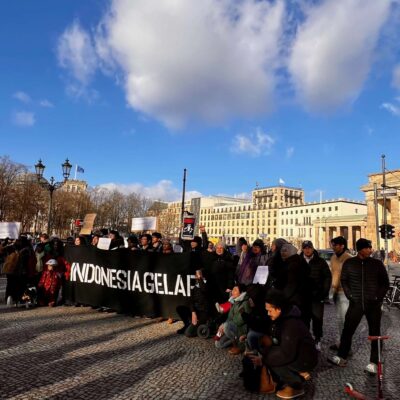The 2024 presidential election will be a crucial moment for Indonesia’s education system.
The country is experiencing a learning crisis. While it has dramatically improved access to education in recent decades, it has had little success in promoting student learning. It has regularly placed towards the bottom in international standardised tests of student learning such as the OECD’s Programme for International Student Assessment (PISA). The most recent PISA, conducted in 2022, saw Indonesia’s scores in reading, mathematics and science fall sharply due to the impact of school closures during COVID-19, signalling a deepening crisis.
This crisis has occurred despite significantly increased government spending on education since the early 2000s, and reforms to enhance competition, accountability, and institutional autonomy within the sector.
The country would gain enormously from overcoming the education crisis. Improved student learning outcomes would facilitate poverty reduction, transition to a knowledge and innovation-based economy, achievement of high-income status, and realisation of the potential demographic dividend the country faces from having a young population. It may also aid democratic resilience given the link between educational achievement and quality of democracy.
If the 2024 presidential election produces a leader who is committed to improving the quality of the country’s education system and promoting student learning, and who is prepared to drive through the policy changes required to achieve these outcomes, it could be a transformational event. If it does not, it will likely lead to yet another lost decade in student learning with attendant consequences for economic, social, and political development.
Slim Prospects for Change
Unfortunately, the presidential campaign so far suggests that the latter scenario is more likely than the former. The three presidential candidates—Anies Baswedan, Prabowo Subianto and Ganjar Pranowo—and their respective vice-presidential running mates— Abdul Muhaimin Iskandar, Gibran Rakabuming Raka, and Mahfud MD—have advanced education policy platforms aimed at enhancing their electability but offering few solutions to the core problem.
Outlined in ‘Vision and Mission’ statements submitted to the Indonesian Electoral Commission and comments to the media, these platforms emphasise the same broad priorities: enhancing teacher welfare, reducing the cost of education for parents and students, increasing funding to Islamic schools, and building research and innovation capacity and industry linkages to underpin transition to a knowledge, innovation and technology-based economy.
Each pair of candidates has distinctive initiatives – Prabowo and Gibran, for instance, have promised to introduce free school meals and milk, Anies and Muhaimin to reduce the costs of higher education, and Ganjar and Mahfud to establish a technology and innovation incubation hub. Yet, in broad terms, their platforms are more similar than different.
This similarity suggests the candidates are not trying to differentiate themselves significantly in education policy and that the new government will have the same broad approach to education regardless of who wins the election. Moreover, this approach will be defined by efforts to further improve access to education (an area in which, as noted, Indonesia has already made great strides), enhance teacher welfare, and promote (arguably fanciful) nationalist visions of technological prowess. It will not be defined by a central concern to improve education quality and learning outcomes, even if some initiatives—for instance free school meals and milk—could have some learning-related benefits.
Teacher Troubles
The candidates’ proposed policies with regards to teacher welfare illustrate the point. All candidates have proposed to increase teacher pay. Some have also offered to enhance job security and benefits for honorary (i.e., casually employed) teachers. Ganjar and Mahfud, for instance, have promised to simplify certification processes for teachers, making it easier for teachers to secure associated professional allowances. Prabowo and Gibran have promised to increase pay for all civil servants, including teachers, and to speed up conversion of honorary teachers to contract status, a change that would provide them with greater security of employment as well as pension and other benefits. Anies and Muhaimin have also promised to “significantly increase the welfare of teachers and allied teaching staff”, implying a substantial pay rise, and to convert honorary teachers to civil servant status.
This approach is likely to be popular with Indonesia’s four million or so teachers and help all candidates attract votes – or at least not lose votes to rivals. Teachers are a key voter bloc: it is often argued that a teacher’s vote is worth several more because teachers have a high status and influence at the community level, particularly in poor regions where decently paid and secure jobs and rival sources of authority and influence are limited. But it is less clear that this approach will improve education quality and learning outcomes.
For the most part, the three pairs of candidates are offering improvements in teacher welfare with no strings attached. They have not outlined plans for teachers to improve pedagogical skills or subject knowledge in exchange for pay rises or other benefits. Only Anies and Muhaimin have suggested that there will be some sort of quid pro quo for these benefits, stating that pay rises will be “tied to performance” and honorary teacher conversions will be “meritocratic” and based on “consideration of needs”. Nor have the candidates proposed any measures to improve teacher recruitment and deployment. Doubtless, this stance reflects a judgement by the candidates that there are too many votes at stake to take on teachers and their unions over their performance and geographic distribution.
Poor teacher quality and unequal distribution of teachers are widely regarded as key impediments to improved education quality and learning outcomes in Indonesia. And many teachers have received significant pay increases since the introduction of the teacher certification process several years ago, without much evidence of accompanying improvements in teacher quality or improvements in teacher distribution. The absence of a quid pro quo for further pay rises and improved conditions risks perpetuating this problem.
A Continuing Crisis
The presidential campaign is not over yet, and the presidential debate at which education policy will be a central focus of discussion is yet to be held. New proposals focused on improving education quality and learning outcomes may yet emerge as may the political will to adopt them. As it stands, however, the three pairs of candidates’ education policy platforms offer little to suggest that the next government will do much to address these challenges. It thus seems likely that the country’s learning crisis will continue into the foreseeable future.
Andrew Rosser is professor of Southeast Asian Studies at the University of Melbourne. His research focuses on the politics of education and health policy and other issues related to human rights in Indonesia.
This article is part of a special co-published series on the Indonesian election led by Asialink’s Insights.
Image: School children in Jakarta, 2023. Credit: Wulandari Wulandari/Shutterstock.




